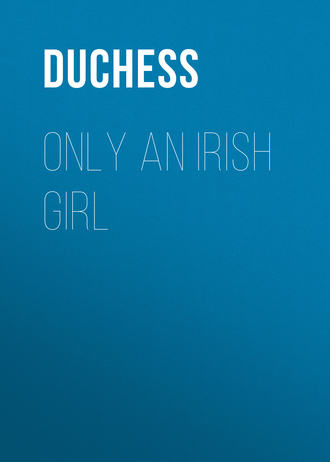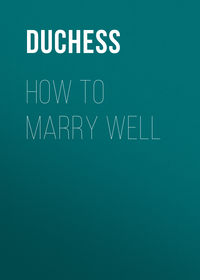 полная версия
полная версияOnly an Irish Girl
"Thank goodness, it's your honor's self!" a woman's voice answers timidly. "I am Patsy McCann, Mr. Launce. Ye mind me?"
"To be sure, Patsy! But what on earth brings you here at this hour, and in such a storm too? I hope you don't come so far from home to do your courting, Patsy?"
"Troth, an coorting's not in my head, yer honor! I've other and blacker thoughts to trouble me!"
"I'm sorry for that, Patsy."
He speaks kindly – it is his nature to speak kindly to a woman – but he is impatient to get home.
"Whist!" the girl whispers, pressing closer to him, till he can see her eyes raised eagerly to his. "Don't go for to cross the bog to-night, Misther Launce. Shure the longest way round is the shortest way home! Don't press a poor girl to speak plainer, but turn back, as you vally your life, Misther Launce!"
"Tut, tut, my girl! I'm far too tired to walk round by Drum at this hour."
"Walk till yer drop, Misther Blake, but don't cross the bog this night."
"Then you must tell why."
But the girl only wrings her hands and moans. She had not expected to meet with opposition of this kind. She took it for granted that when he heard it would not be safe to cross the bog he would go back. She did not know the temper of the Blakes of Donaghmore.
"There, get home, Patsy," he says at last, out of patience; and he is feeling tired after his long day's sport too. "It's time all honest girls were at their own firesides."
"Sorra an inch will I stir till yez promise not to put yer foot on the bog this night! Shure the boys are out, not by twos nor threes, but by scores; yez would be shot down before yez could get half-way over!"
"Ah!" he says, and draws a deep breath. It is not a pleasant prospect, but the hot blood of a fighting race is running fiercely in his veins.
At this moment the sound of men marching in step comes through the stillness. Yielding to an impulse for which he could find no reason, Launce draws back a step – the girl has disappeared as if the earth had opened and swallowed her – and in another second a small party of men, walking two abreast, is close beside him – county police unmistakably; and a tall, upright man is a little in advance of the rest. He is speaking in a low voice as they come up, but Launce hears every word.
"Good idea to think of following young Blake. They are sure to assault him; they have been waiting for a chance like this for weeks past. Then we must just close in and catch as many of the rascals as we can. Look out for this Magill – a tall fellow in a soft felt hat. I would give fifty pounds to land that fellow safe and sound in Kilmainham."
As Launce listens a furious anger stirs within him – a rage so strong that it is as much as he can do to refrain from springing out upon the cowardly speaker. He knows the man now – he would recognize those smooth false tones among a thousand – it is Mr. Hunter, Mrs. Dundas's guest and friend, the man whom from the first he has disliked and distrusted. A horrible suspicion, a chill doubt, makes him shake from head to foot. Did Kate know of this? Could it be that the woman he loved had seen him go out, a predestined victim, so that this spy might lodge one or two more rebels in Kilmainham jail? A bitter word breaks from his lips as he thinks of it. This poor girl – for now that the police have passed Patsy has reappeared, like a phantom, out of the darkness – in her ignorance and helplessness has been more true to him than the woman he has loved so passionately.
"You have saved my life, Patsy, and I'll not forget it; but I'm not sure that it would not have been better for me to have gone on in my ignorance and taken my chance!" he says grimly.
"The saints be thanked!" the girl answers solemnly. "I have done what I said I would do, and my heart is aisy this night!"
CHAPTER VII
A chill gray dawn is breaking when Honor Blake opens her eyes. She is in bed in her own room, and her father is siting beside her, watchful and anxious. At first she wonders to see him there, then slowly a dim sense of pain and fear comes back to her.
"You are better?" he says cheerily. "That's right! I'll go away now, and you'll get a sleep; but Aileen shall stay in the room, in case you should feel faint again."
"Faint?" she repeats, with a smile. "Have I been faint then?"
"Faith and you have, my dear! I never knew any one stay so long in a swoon before. I half thought you were dead when I saw you first; but you are better now, and we'll talk no more about it."
As he rises, she sees that he carries his left arm in a sling and that he looks tired and pale. Then suddenly every detail of the past night comes back to her, and she feels for a few seconds as if she should sink back into unconsciousness again.
"It's nothing – a mere scratch; but they insisted on dressing it up like this!" her father cries hastily, seeing the change that has crept into her face. "No one is much hurt but that rascally groom of yours. He's got a skinful that will keep him quiet, or I'm mistaken!"
"Father," the girl whispers faintly, "some one was in it last night who – who must be saved at any price. It would kill me, I think" – pantingly – "if harm came to him."
Her father's face, as he listens, has grown as hard as a face cut out of granite; and she knows, before a word is spoken, that her plea has fallen upon deaf ears.
"They must take their chance," he says grimly; "I would not stir a finger to save the life of any one of them."
Honor knows that there is no more to be said; but as she sinks back among her pillows, a passionate determination to save this man whom she loves rises in her heart. But does she love him? He has been very dear to her all her life; but now a great gulf has opened between them – they can never be to each other as they have been. The past is as dead as the love that made it so bright and so beautiful; but, for the sake of that dead past, she feels that she must save him from the consequence of this mad folly into which he has been led or driven.
The birds are singing, now, the sky has grown suddenly rosy, and the new day is as calm and bright as the night was wild and stormy. But to Honor Blake no peace comes, no brightness. It seems to her she shall never know peace again.
As she is turning into the morning-room, a heavy step on the tiled floor makes her look round; and Launce stands before her. With a glad cry the girl flies to him.
"Oh, Launce," she sobs, "we thought you were shot last night; and we – "
But he stops her almost impatiently.
"And what happened here last night? What is the meaning of that – and that?" – pointing at bullet-holes in the walls and the door.
"Why, Launce, have you not heard?"
"I have heard nothing," he says shortly, "about Donaghmore."
She looks at him wonderingly – at his soiled dress, his haggard face and fierce eyes, so unlike the face and eyes of her favorite brother.
"Where have you been all night, Launce? And what has happened to make you look so dreadfully ill and – and strange?"
He has followed her into the morning-room and closed the door behind them.
"I have been to Drum with the body of that fellow who was shot on the moss."
"Oh, Launce, who was he?"
He sinks down upon a chair before he answers her – a man tired in body and mind. Utterly worn out he looks now in the clear strong light.
"He was Mrs. Dundas's friend and guest – her lover, for all I can tell," he says scornfully. "I hope she is proud of him and of the end he has come to. He was shot down like a dog. I heard the cry he gave, I was so close behind him."
The tears are rolling down Honor's cheeks; she is trembling so that she can scarcely stand.
"Oh, Launce," she cries piteously, "and it might have been you!"
"It ought to have been," her brother says, with a low harsh laugh that echoes dismally through the quiet sunny room. "That is where the mistake comes in!" Honor looks at him in dismay. He is so unlike himself that he frightens her. "I was to have gone first – according to their program – so that the men might attack me and give the police the chance of coming down upon them unawares. She saw me go out of her house to what she thought would be certain death, and she never lifted a finger to keep me back. That was womanly, wasn't it?"
The girl cannot answer him. She has never liked this woman – she has shrunk from and distrusted her always; but she never dreamed she could be capable of treachery so base and cruel as this.
"And whom do you think they were after?" Launce says, after a pause. "Power Magill! To think of a man like that being mixed up with the rabble rout that was out last night! But they missed him; and, though I hate the fellow, I was glad that they did."
The girl has crossed the room and is standing close beside him now, her hand on the arm of his chair, her white face bent toward him.
"No, Launce, they did not miss him – he was taken here!" He listens; but it is evident that he does not understand. "Yes, in this house," the girl goes on coldly, "where he has been a welcome guest and friend all his life! He came in with the rest to threaten and rob – and murder, too, if need be, I have no doubt! We have been fortunate in our friends and neighbors, Launce!"
"By Jove!" he gasps, and sits and stares at her – a man thoroughly startled and distressed.
Not to him need she apply for help in the plan that has already vaguely formed itself in her mind. She knows quite well that he would rather hinder then help her in any effort to save Power Magill. If he is to be saved at all, it must be at once, before they have time to remove him to Dublin; and the girl's heart throbs and her brain grows dizzy as she tries to think out her simple yet daring scheme. It is that some one – as near his height and build as possible – should get leave to visit him, and then that they should change clothes, and Power Magill should walk out in place of his visitor. She has read of such things being done before; why should they not be done again? But the question is, What man in the county would willingly take the place of Power Magill?
"It must be done," the girl says to herself, as she listens to the talk going on about her; for of course every one is talking of the men taken in the affray of the past night, and their chances of heavy punishment. "Some one can be got surely, to run the risk – if not for love, then for money!"
Brian Beresford is away at Drum; and she is glad of it – it would be awkward to have him about the house at the present crisis.
About a mile from Donaghmore, on the Boyne road, stands a cottage that, in the summer season, is almost hidden from sight by the masses of wild roses and jasmine that cover its old walls. It is a picturesque little place enough, and wondrously clean for an Irish cottage; but it is not in good repute in the place. Magistrates shake their heads when they hear of meetings held on the quiet at Hugh Scanlan's; and more than once terror and disaster have been carried into quiet homes by order of the men who meet there.
Scanlan is a man over eighty, but erect and vigorous, and full of subtle cunning. It is to this man Honor turns in trouble and perplexity. He is no friend of hers – all her life she has been taught to look upon him as an evil man and a bad neighbor, who would do any harm that lay in his power to her or hers. But to this she never gives a thought now. Power must be helped; and, if any man in Donaghmore can help him, it is Scanlan.
The afternoon sun shines brightly upon the strip of garden as she opens the gate and walks up to the half-closed door. From the threshold she can see all round the one room that the place contains. It is low, and would be dim but for the great fire burning, hot as the day is, on the low hearth. The owner of the cottage has been sitting before the fire smoking; but, at the sight of Honor standing on his doorstep, he rises to his feet.
"Good-evening!" the girl says in her low clear voice. "I want very much to speak to you! May I come in?"
For an instant the ready tact of his race seems to forsake the old man, and he stares at her stupidly.
"Robert Blake's daughter asking to come into my house?" he mutters, raising his withered hands with a gesture of the most intense surprise.
"Yes," the girl answers gently. "I am in trouble; and I want you to help me, if you will."
She has stepped forward uninvited, and is close beside him now, looking up into his face with eyes that have not a shadow of fear or even distrust in them.
"There are more than yourself in the deep trouble this day, miss."
"Yes; and it is about one who is in deep trouble that I have come to talk to you."
He has placed a chair for her full in the light of the open door, where he can see every sign of feeling that crosses her face; but he keeps well in the shade himself. Oh, how Honor's heart beats as she looks up at him and realizes that in this very room the leaders of last night's outrage may have met to arrange their plans! She is not afraid, though her reason tells her there might be grave cause for fear in placing herself in the hands of a treacherous man and an open enemy of her father's house.
"Faith, miss, an' if it's all wan to you, you may do the talking and I'll listen! Talking is mighty dangerous for the loikes of me, these times!"
"Yes, I know," the girl replies; "but I do not want you to talk. I will tell you what I want you to do, and then you can say, 'Yes' or 'No,' as you think best. But, oh" – with a sudden clasping of the gloved hands lying on her lap – "I do hope you will say 'Yes'!"
And simply and clearly, her pretty voice broken in its earnestness, her eyes shining like stars as they fix themselves on the gray wrinkled face before her, she tells him what it is she wants done, and how much she can offer toward paying for the doing of it.
"It is not much," she says, looking at the small roll of Irish pound-notes in her hand, "but it is all I have of my own in the world; and, when he is free, he will pay you himself liberally."
The old man listens to her like one lost in a dream. She looks to him more like an angel than a living woman as she stands there pleading so earnestly – for, in her agitation, she has risen and is facing him, the sunshine falling like a glory all about her.
In his excitement he takes to blessing her in Irish, and, as the rapid words, instinct with strong feeling, [lack in the text] upon her ears, Honor draws back disconcerted.
"Are you angry?" she says. "I thought you would have been glad to help him! He has given up everything – friends, position, home, and country, it may be, for this cause to which you belong."
"And I have nothing to give up but my life," the old man answers with sudden unlooked-for dignity; "and that I would lay down this hour to see him free and safe once more."
"Then you will help us?" she says eagerly.
"Shure I'm the most helpless of ould creatures, but I'll do what I can," he answers guardedly, and with so swift a change of voice and manner that Honor almost loses hope.
However, there is no choice left her now, nothing to be done but to give the man her poor little bribe and go home, leaving Power Magill to his mercy.
Little does the girl dream, as she walks sadly back to Donaghmore through the waning light, that she has formed a protecting barrier round the old home and its inmates that will outlast the storms of years.
CHAPTER VIII
Very slowly the days pass at Donaghmore; a detachment of the constabulary keeps strict guard over the old house, the master of which lies sick unto death.
It seems as if the old man's life is fading with the year. The shot that entered his arm shattered the bone immediately below the elbow, and, the wound not healing, this, together with the shock and excitement of that night's work, is telling on him.
Honor goes about like a ghost; she looks pitifully changed; but there is only faithful old Aileen to be troubled by her looks. Launce has gone back to Dublin and Horace has joined his regiment at Aldershot.
One care has been lifted off the girl's heart; Power Magill is no longer a prisoner.
The first thing that Honor heard on her return from Scanlan's cottage was that Power Magill and two others had got away, having given their guards the slip on the mountain road between Glen Doyle and Drum.
The body of the man who was shot on the moss that terrible night has been taken to Dublin by his friends, to be buried among his own people; and, if he was Kate Dundas's lover, as Launce in his jealous rage declared, the widow has certainly taken his loss very coolly.
But there is one thing that she is not taking quite so coolly, and that is the desertion of her admirers. Rose Mount is no longer the center of attraction to the neighborhood – its pretty drawing-room is deserted. Men do not care to visit at a house about which such ugly reports are circulated. They even fight shy of its beautiful mistress in public, and this is perhaps the cruelest form which punishment could assume for such a woman as Mrs. Dundas. She knows nothing of friendship and very little of love, but her desire for admiration is boundless, and her chance of that in Drum or Donaghmore is at an end forever.
November has set in cold and stormy. It seems to Honor, nervous and anxious as she is, that the wind never ceases day or night, and sometimes its shrill moans make her feel as if she were going mad.
Her father is able to come down-stairs now, but he misses the boys, and complains fretfully of the loneliness of the house.
One day Honor walks over to the rectory to see Belle Delorme. Belle is in the drawing-room reading a yellow-bound novel, which she slips dexterously out of sight at the sound of her visitor's voice.
Belle is not quite so piquant and dashing as she used to be, perhaps; but if she has been fretting for Launce – as Honor thinks – she has certainly lost none of her good looks in the process.
She looks up now with a smile as Honor enters.
"I was just going over to tell you the news, dear. I know you never hear anything at Donaghmore."
"The news!" Honor falters, turning from white to crimson; her first thought being of some new danger threatening Power Magill.
"Oh, it's nothing very wonderful – perhaps nothing that you will call news after all!" Belle says hurriedly, seeing that swift blush and understanding it. "It is just that Ross Mount is closed, and its mistress has flown away to England. Sure they are saying now that she has a husband over there, alive and well, a farmer somewhere in Devonshire. Maybe she has gone back to him."
"Maybe she has," Honor assents coldly.
"And they are saying too," Belle goes on more gravely, and looking anxiously at her friend, "that the two men who were with Power Magill have got off to America. I'm sure I hope it is true!"
Honor says not a word. She is thinking of the man who is left a homeless wanderer on his native mountains – an exile within sight of his own walls!
"It's an awful pity about poor Power, isn't it, Honor? Sometimes I cry my eyes red thinking of him," Belle goes on in her pretty plaintive voice; "and I often think he must have gone with the rest to Donaghmore to keep them in order. He couldn't have gone, you know, to – to do any harm!"
Honor looks at her gratefully, and the words linger in her mind and comfort her in some vague way during her long and lonely walk to Donaghmore.
The sun has set as she enters the gates, and a mist which has crept up from the river makes the wide empty space on her left, as she walks up toward the house, look more like a lake than solid earth.
She has left the ruins behind her, not without a nervous shiver in passing, when the sound of a step, falling lightly but regularly on the strip of grass by the side of the drive, arrests her attention and sets her heart beating rapidly.
"It is all my own foolish fancy," she says to herself, and walks faster.
The step follows faster too. She stops, and instantly that light footfall is silent. Not a creature is to be seen. The old ruins rise grim and bare between her and the pale evening sky, but not a sound comes from them.
"It must have been my own fancy," she tells herself, and, reassured, starts forward almost at a run.
But listen! Again the step sounds behind her; more distant and far less rapid than her own, but clear and unmistakable. Her heart gives a great throb, the color dies out of her cheeks, and by the time she reaches her own door she feels ready to fall from haste and fear.
The old butler is crossing the hall and he looks at her curiously.
"Have you seen anything to startle you, Miss Honor?" he says at last.
"No; I have seen nothing. Why do you ask?" Not for worlds would she own to any one the ghostly fears that shook her out there in the dusky avenue, with the sound of those following steps in her ears.
"Well," adds the butler, "one of the girls has just come in, miss, in a state of great fright, and says that she saw the old abbot himself at the corner of the avenue, watching the house for all the world as if it held some treasure of his own."
"Nonsense!" Honor says, turning suddenly pale, even in the lighted hall. "I hope these silly tales are not going to begin again. Your master will be very displeased if they come to his ears."
As she enters the sitting-room she sees that her father is not alone.
A tall man is standing on the rug before the fire, talking with much animation. It is Brian Beresford.
"I have taken the liberty of invading you without even an invitation," he says, coming forward with outstretched hand.
"And you are welcome," the girl answers softly. "Besides, your last invasion was so well timed, we may well forgive this one."
"Ah," he says, smiling gravely, "that was a rough sort of invasion! I hope I shall never have to attack Donaghmore in that fashion again."
"I hope not indeed!" Honor agrees promptly. "I don't think I could live through another night like that."
"Oh, yes, you could – through a dozen such, if necessary. I quite admired your bravery. I never saw a young lady so cool under fire before."
She blushes as she listens; her heart thrills with a half-reluctant pride at his praise.
"What has come to me," she says to herself crossly, "that I can't look at the man without blushing? It's time I had more sense."
"I have come to stay a day or two," he tells them.
A week passes, however, and he does not go away. To Honor it is a week of very mixed sensations. She has never before known any one like this stolid Englishman, who under all his composure hides a passion so fiery, a will so strong.
On his part he is very grave and gentle. Not once does a word of love pass his lips; and she is glad of it, for she is in no mood to think of love or lovers.
"It would be horrible to think of such things," she tells herself, "while poor Power Magill is wandering in homeless misery."
She is thinking of him to-night as she looks out at the moonlight, lying chill and white on the grass and the bare flower-beds.
"Where is he now?" she asks herself with a shivering sigh, as she listens to the restless creak and sough of the trees. It is a question she is asking continually; but who can answer it?
He may be lying dead on some bare hillside, or at the bottom of some dark gorge in the mountains.
From the drawing-room window she can see across to the drive. Some one is coming slowly toward the house – a girl, little more than a child, with an old cloak flung over her head – country fashion. Honor watches her, and wonders which of the village people have been brave enough to pass the ruins of Donaghmore at this hour.
The girl comes straight on to the window at which Honor is still standing. When she is quite close she opens her cloak and holds out a letter – not a bulky letter, a mere scrap, closely twisted; and, without a second thought, Honor raises the window and takes it out of her hand.
"Who has sent it, Nora?" – for she recognizes the child now that she sees her face.
But Nora only shakes her head and hurries away, passing over the moonlit grass like the mere shadow of a girl.
The gentlemen are stirring in the dining-room now; she can hear their chairs being set back, and her father's voice as he opens the door for their guest.









